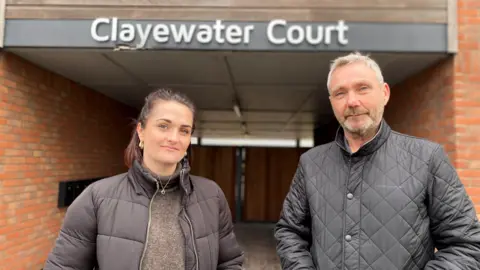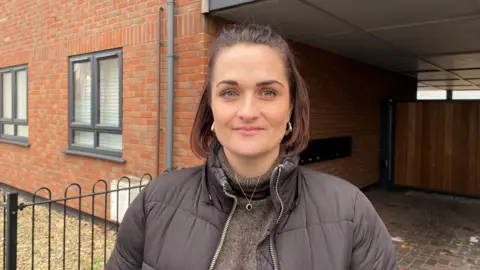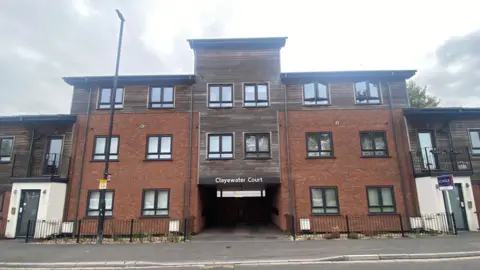'£700-a-month cost for fire warden heartbreaking'
 BBC
BBCLeaseholders living in a building with unsafe cladding have said being charged almost £700 each per month to fund a "waking watch", to prevent a fire, is "heartbreaking".
A new survey on Clayewater Court in Bristol, which was previously deemed a fire risk, has resulted in the freeholder employing a 24-hour fire warden to walk the corridors.
Resident Lucy Tissington said: "That's just money I can't afford, especially when they demand it immediately."
HomeGround, acting on behalf of the freeholder, Adriatic Land 5 Limited, said it had been approved for government funding to replace the waking watch with a fire system.
However, Ms Tissington said: "It's not until we get that installed and in place that this extortionately expensive service stops."
She explained that each leaseholder had been charged about £2,000 since October.
"It's been really, really stressful trying to figure out where this money's going to come from, if it's ever going to stop."

A HomeGround spokesperson said, along with the building's management company BNS, it had "acted quickly to progress a Waking Watch Relief Fund application".
"In the meantime, we have made efforts to support residents, including a loan from the landlord to cover the waking watch costs, and to expediate the fire alarm installation whilst the funding application process is ongoing."
Earlier this month, the government announced new deadlines to fix cladding on unsafe high-rise buildings that are covered by government-funded schemes.
The remediation plan did not include buildings under 11m high, such as Clayewater Court, which Ms Tissington said was "incredibly unfair".
"Why are the people who can actually do something about it just turning their back on us?" she added.
A Ministry of Housing, Communities and Local Government spokesperson said: "While remediation work is rarely required in buildings under 11m, we are determined to make homes safe and deliver security for residents across the country.
"We would urge leaseholders in these situations to write to us so we can investigate."

When the waking watch costs began, "it was heartbreaking", said Ms Tissington.
"It's the fear that I had. I knew that I wasn't safe from fire and I wasn't safe from any costs.
"It's spiralling out of control and you just don't know how you can move on when it's taken your savings, it's taking your money every week. It's never-ending."
Ms Tissington who has previously spoken to the BBC about the "huge emotional impact" of not being able to sell her home, said residents were told about the waking watch one hour before they arrived.
She said while the fire wardens were "nice people", some residents see them standing outside their windows while they are trying to sleep, making them feel uncomfortable.
HomeGround said the waking watch was put in place "to ensure the safety of residents following a fire risk assessment".

Ms Tissington's neighbour, Alan Morris, said there had been a "mass exodus" in the building with most leaseholders renting out their homes.
"I think people are just fed up with the place," he said.
Mr Morris explained Clayewater Court was actually taller than 11m, but the measurement is taken from the floor of the highest liveable room.
"The cladding does go up to over 13m at the top of the actual building, which doesn't make sense to me.
"The cladding there is going to burn [in case of a fire]."
He added: "I just don't understand how this can happen from a brand new build.
"Somebody has to be culpable. It seems like we're banging our heads against a brick wall."
The HomeGround spokesperson added: "We will continue our efforts to ensure that the cost of the waking watch is removed as soon as possible."
Follow BBC Bristol on Facebook, X and Instagram. Send your story ideas to us on email or via WhatsApp on 0800 313 4630.
